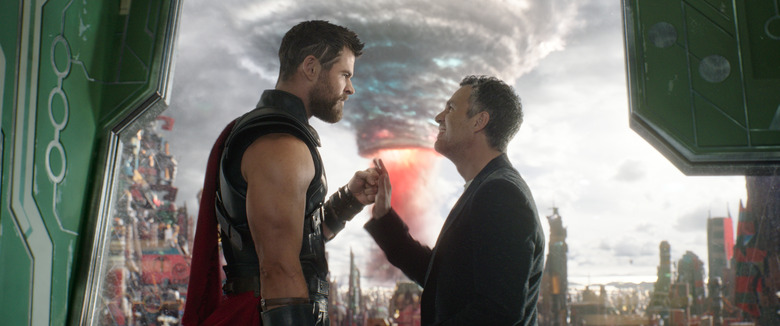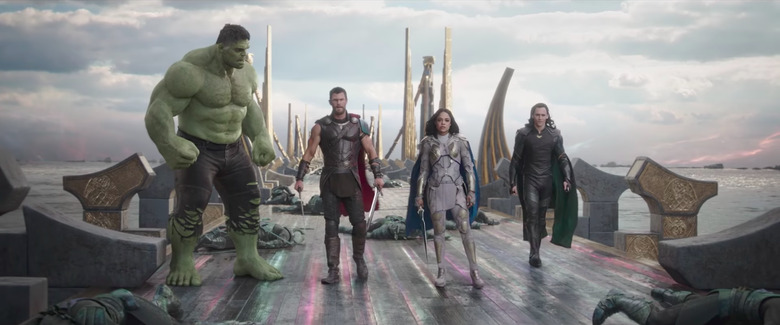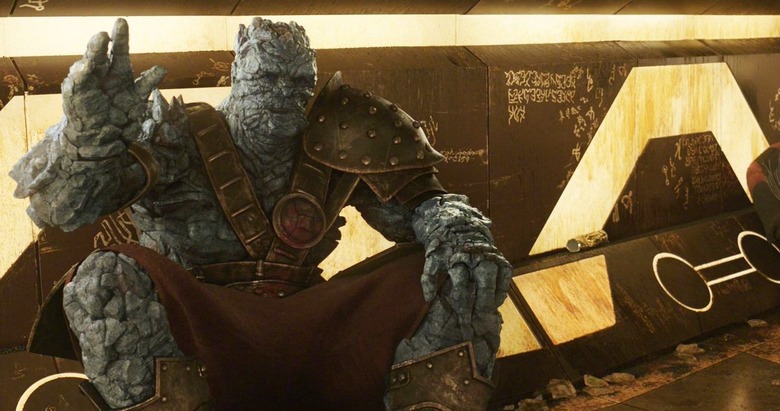'Thor: Ragnarok' Is A Superhero Comedy About The Horrors Of Colonialism
(Welcome to Road to Infinity War, a new series where we revisit the first 18 movies of the Marvel Cinematic Universe and ask "How did we get here?" In this edition: Thor: Ragnarok reinvents the God of Thunder with humor and subversion.)
Compared to Iron Man and Captain America, Thor feels short-changed in both his Avengers appearances. His first solo film narrowly misses a coherent character arc. His second doesn't give him one at all. He is, at once, one of the most popular Avengers and one of the least narratively interesting.
Or rather he was, until New Zealand's Taika Waititi was handed carte blanche for the character and his grandiose world.
To say that Waititi made a weird movie would be a disservice. It's a really weird piece of an even weirder puzzle, course-correcting Thor's prior installments while leaning all the way into the Jack Kirby-esque designs of Marvel's golden age. It has a giant undead wolf. It has a kindly rock monster. It even has a Hulk, but it also has Jeff Goldblum as The Grandmaster, a character so fun and alluring that you forget he's a human trafficker who sends people to their deaths for sport. Which, in essence, is the thesis of Thor: Ragnarok, a comedy about the effects of downplaying colonialism, made by an unapologetically Maori filmmaker.
Thor 2.0
Even before the first frame of Ragnarok, Waititi fit like the glove. The What We Do in The Shadows director crafted a pair of comedic mockumentary shorts detailing Thor's absence during Captain America: Civil War. Before we knew it, the God of Thunder had been entirely rewritten. Gone was his detached stoicism, replaced by a ludicrous arrogance that permanently bridged the two worlds he previously straddled. The absurdity of Thor's presence in the MCU once stemmed from the interaction of old-world regality with the supposed normalcy of the modern West. Given that very little of Thor: Ragnarok takes place on Earth however – and what little does features a New York-based sorcerer called "Doctor Strange" – Waititi chose instead to lean into the absurdity of Thor himself, and the realm from which he hails.
Both Thor and Thor: The Dark World fail to put Asgard into any kind of contemporary context. The kingdom's technology may be futuristic, but everything underlying its fantasy is archaic. Its monarch Odin makes constant reference to the conquering of other realms. This is a universe at war, or at the very least a universe shaped by its effects. As its core, Thor is a franchise about a warring people led by a (once) warmongering prince, but war itself is relegated to the margins. While Anthony Hopkins' layered performances in both films makes Odin far more interesting in retrospect – what we learn in Ragnarok contextualizes the weighty guilt behind his eyes – we had only ever seen a selective history of the Asgardians as told by Odin himself. The time they saved Earth from the Frost Giants. The time they stopped the Dark Elves from using the Aether. What we don't see however, is why Asgard was locked in conflict with these peoples in the first place.
Waititi allows his Asgardians to have interior lives beyond their positions in the heircarchy – barring the less interesting returning characters he immediately disposes of. Thor, for instance, is now a cocky bastard who greets trouble with a wry smile. His actions are far more heroic, but he's still the Thor of the first few scenes of his introductory film, albeit with a naturalistic twist like something out of an Asgardian The Office. Waititi's Thor taps in to Chris Hemsworth's comedic innocence by understanding something previous incarnations didn't seem to: his arrogance and his heroism don't have to be mutually exclusive.
Heimdall (Idris Elba) is now a rebellious warrior rather than simply a gatekeeper, and his old position is filled by Skurge (Karl Urban), a janitor rising through the ranks so he can collect junk from other worlds, falling in line before he eventually finds the courage to rebel against Hela. Loki is similarly fleshed out in order to rewrite his previous appearance. Usurping the throne while disguised as Odin was a strange move in Thor: The Dark World. The God of Mischief was so prone to aggrandizing himself that he tried to make his Avengers conquest as public as possible. Ruling from the shadows wouldn't serve his purpose, which is why Waititi has him use his father's position to build statues with outstretched arms in his own honour, and he even puts on plays retelling his supposed heroic sacrifice.
It's only fitting that Loki's theatricality translates to a love of literal theatre, and it's this theatricality that ties in to his eventual turn to good. Once Loki is pre-emptively betrayed before he can betray Thor for the thousandth time, this stinging failure causes him to re-orient his approach, but his showmanship remains intact. Loki never stops seeking glory. Like Thor, his cockiness makes him who he is, and retaining it has more comedic and dramatic potential. But this time, when Loki returns to Asgard, his outstretched arms are those of a saviour announcing his arrival. He steals the spotlight while ferrying Asgardians to safety, as their country is razed to the ground.
The Golden Kingdom
Waititi's course-correction afforded him the opportunity to go all-out with the Asgardian setting. Not only is the kingdom's history revealed to be a lie, with images of peaceful treaties papering over the truth of its violent conquests, but the film's villain is the very embodiment of colonialism undealt with.
Hela (Cate Blanchett), Thor's forgotten sister, led many of Odin's colonial battles – wars fought to make the nine realms fall in line with Asgard. And while we don't see the full version of history from anyone else's perspective (save for Tessa Thompson's Valkyrie, an Asgardian herself), what we do see is Odin finally admitting to his misdeeds. Asgard's history is a bloody one, and rather than curing the disease, Odin simply locked away a symptom and kept the other realms under his rule. That symptom is intrinsically connected to Asgard itself, the realm from which Hela draws her power. So long as the kingdom exists, so will the effects of its violence.
"Where do you think all this gold came from?" she asks, recalling Laufey's assertion in Thor (2011) that Odin "is a murderer and a thief." As it turns out, looting, plundering and unconfronted imperialism are what made Asgard great. It's a nation state that, despite its rich culture, has crimes in its rearview that it refuses to acknowledge. As with any postcolonial nation that has freedom on paper but not in practice, a history forgotten is merely a history waiting to be unwritten.
Surtur the fire demon, ruler of the isolated realm Muspelheim, considers destroying Asgard his destiny. Whatever his reasons – perhaps a missed opportunity to make him a victim of Odin's colonizing – this prophecy ("Ragnarok") is one Thor deals with in the very first scene. He defeats Surtur, and makes sure Asgard will stay intact. But perhaps he shouldn't have. After being discarded on trash planet Sakaar and living amongst slaves and potential revolutionaries, Thor returns to Asgard to free his people from Hela. Only his kingship thus far, in both prior films, has always been about maintaining the status quo. And while the film's rewriting of Thor leaves little room for him to actually arrive at this conclusion – via character-driven realization rather than being told by his departed father – his first decision as king is to facilitate "Ragnarok" itself.
"Asgard was never a place," Odin tells him. "It is a people." While the assertion exists to drive Thor's defeat of the murderous Hela – destroying Asgard would mean draining her of her unfathomable power – it's a statement that exists in direct contrast to what Thor has known Asgard to be: a nation state. By divorcing Asgard's people from a physical place (like the Maori, who travelled to New Zealand by ship around the 13th century, carrying their culture with them), Thor not only becomes the leader of a refugee tribe, but he causes the destruction of a hegemony whose violent past still ripples across the realms.
The Taika Effect
After stepping outside Hollywood's traditional narrative perspective in both Doctor Strange (a tale of accepting non-Western philosophies) and Guardians of the Galaxy Vol. 2 (featuring another villainous manifestation of Western colonialism), Marvel embraced this new direction by hiring a storyteller from a postcolonial culture. Waititi himself is an advocate for course correcting colonial history – changing Australia Day, for instance, which celebrates the arrival of British colonizers at the cost of its indigenous peoples. His perspective on colonial history is imbued into the very fabric of Thor: Ragnarok, all the way down to the jokes. The Grandmaster for instance, who refuses to use the word "slavery" because it makes him more uncomfortable than actual slavery, sugarcoats a colonial reality for the sake of his own comfort, not unlike Thor's father.
The Valkyrie are also imbued with an indigenous sensibility, identifying themselves by tribal name and marking. Tessa Thompson's Valkyrie, Scrapper 142, is the unnamed lone survivor of her warrior tribe. Her seeming loss of identity after being defeated by Hela (the shadow of colonialism itself) makes her to turn to drink – not unlike the problems of alcoholism plaguing displaced indigenous communities in New Zealand and elsewhere. This set-up makes her return to Asgard all the more glorious, as she accepts her ancestral role once more by donning the Valkyrie garb and stepping out onto Asgardian soil backed by fireworks, in a ship bearing the colours of the Aboriginal flag.
Ragnarok is a distinctly Waititi and a distinctly Kiwi film through and through. It features not only Kiwi comedy's signature deflation of grandeur, which the director wielded deftly in his other works (not to mention carrying forward his penchant for displaced characters), but it also features Waititi himself. He voices Korg, the imposing rock creature. Though rather than making Korg some hyper-masculine warrior (like Thor), Waititi opts instead for a "type" rarely seen in an American cinema: a soft-spoken Maori bouncer. And what a joy he is.
By allowing Waititi to put his signature all over one of its key properties, Marvel was able to craft a story that felt both authentic and fresh, owing to a narrative perspective usually unseen in mainstream cinema. Even the little details feel drawn from corners that Hollywood doesn't normally look to. The parade celebrating Hulk as the Grandmaster's champion, for instance, is modeled on the Hindu festival of Holi, which commemorates the victory of good over evil with coloured powder.
Ragnarok is a Marvel film that remixes Marvel itself, often to farcical effect. Thor imitates Natasha's romantic lullaby from Age of Ultron to calm the Hulk down. Banner heroically jumps out of a plane – a familiar Marvel action beat that began in The Incredible Hulk and was carried over in Iron Man 2, the first two Captain America films, and even Black Panther – though he lands flat on his face. Even outside of these singular callbacks, Ragnarok sees Marvel using the details of its world to comedic effect, leaning in to its comicbook inspirations without ever poo-pooing the source material. The film certainly has the same amount of colour and pizzazz as the Guardians of the Galaxy series, but its sets, creatures and costumes have the distinct geometry of Jack Kirby designs, trading in space-set versions of the familiar for a world where everything is angles and circles in larger than life permutations, simply because.
That's what Thor: Ragnarok feels like. A movie that, after franchise entries by a Shakespearean auteur and a Game of Thrones director, was handed to a guy known for a vampire mockumentary, simply because. Waititi had no doubt proved himself skilled at balancing lore and character, but in stepping outside the traditional American hiring pool, Hollywood's premiere franchise delivered a space-set comedy in which the Hulk suplexes a giant wolf, but one in which a literal God alters the direction of his legacy by destroying it.
Thor: Ragnarok further altered both Marvel's in-world status quo as well as the status quo of its creative worldview, shifting the needle significantly on who gets to tell these stories – a shift that would hit its zenith with the final film on the "Road to Infinity War."
We're almost there, folks.



